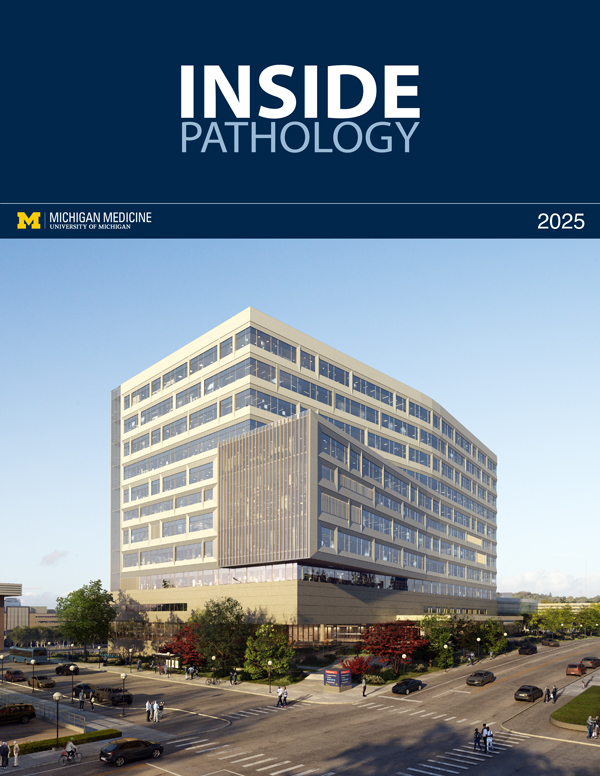

RESEARCH INTERESTS
|
 |
|
Since my postdoctoral fellowship, I have been focused, though some might say obsessed with the embryonic development of the kidney. This is in part because the lab identified an essential control gene that specifies the region of mesoderm destined to become the kidney. However, I view the kidney as a model system to understand more general principles of embryonic patterning, differentiation, and cell lineage specification. How do cells know they are supposed to make kidney epithelia and when do they know this? The answer is surprisingly early, shortly or coincidentally with mesoderm compartmentalization along the medio-lateral body axis. The lab has shown that Pax2 is essential for the conversion of renal mesenchyme to epithelial tubules. Along the way, we also discovered that Pax2 is active in many renal diseases. One of the advantages of studying organ development is that many of the genes and biochemical pathways that drive development are also factors during the initiation and progression of disease. More recently, we have shown that Pax2 activity is dependent on activation of serine/threonine kinases and that this can be suppressed by certain co-factors. These results will prove critical in understanding how Pax proteins in general respond to inductive signals. Other areas of investigation in the lab have included cell-cell adhesion and cell signaling. We were the first to describe the sequence of cadherin gene expression during mesenchyme-to-epithelial conversion and to characterize a mutant in a type II cadherin. Investigations into cell signaling pathways during kidney development have led to the discovery of glial-cell derived neurotrophic factor as a ligand for the c-ret receptor. The importance of this pathway in epithelial cell migration and chemotaxis was first described by my lab. More recently, we identified the KCP protein as a modifier of the bone morphogenetic protein (BMP) signaling pathway. KCP was the first secreted molecule to enhance, rather than suppress, BMP signaling. We show that it increases ligand-receptor interactions and smad1 phophorylation. KCP also suppresses TGF-beta signaling and Smad2 phosphorylation. Together, these contrary effects act to promote recovery from renal injury. Thus, a mouse homozygous for a KCP null allele that we created is hypersensitive to renal fibrotic disease. Currently, we are focused on understanding the role of Pax2 and a new interacting partner called PTIP in epigenetic imprinting of chromatin. PTIP was first cloned by my lab and shown to be essential for development in the post-gastrulation embryo. Recent data show PTIP is part of a histone methyltransferase complex. Pax2 can alter the pattern of histone mutilation on specific DNBA sequences. Together these results indicate that cell lineage restriction and early patterning may be controlled by heritable modifications of histones. The PTIP protein may provide a link between tissue and locus specific DNA binding proteins and the cellular histone methylation machinery. We are now taking systematic approaches using expression microarrays and genomic tiling arrays to understand how transcription factors bind to specific genes and alter the pattern of histone modifications. These experiments will help define what makes a cell committed to a certain fate, how that fate is heritable, and how stem cells can avoid fate restriction and retain pluripotency. My long term goals are to understand how master regulatory switches can impart cell fate restriction and cellular memory in response to positional information during development. How this memory is stored and interpreted to generate specialized cell types forms the molecular the basis of growth and differentiation. ***************************** The lab is accepting graduate students through-
Entering graduate students can rotate through the lab at any time.
Students in the lab can choose between either: http://www.med.umich.edu/cmb/ https://www.pathology.med.umich.edu/phd-program
|
|
 ON THE COVER
ON THE COVER
Breast team reviewing a patient's slide. (From left to right) Ghassan Allo, Fellow; Laura Walters, Clinical Lecturer; Celina Kleer, Professor. See Article 2014Department Chair |

newsletter
INSIDE PATHOLOGYAbout Our NewsletterInside Pathology is an newsletter published by the Chairman's Office to bring news and updates from inside the department's research and to become familiar with those leading it. It is our hope that those who read it will enjoy hearing about those new and familiar, and perhaps help in furthering our research. CONTENTS
|
 ON THE COVER
ON THE COVER
Autopsy Technician draws blood while working in the Wayne County morgue. See Article 2016Department Chair |

newsletter
INSIDE PATHOLOGYAbout Our NewsletterInside Pathology is an newsletter published by the Chairman's Office to bring news and updates from inside the department's research and to become familiar with those leading it. It is our hope that those who read it will enjoy hearing about those new and familiar, and perhaps help in furthering our research. CONTENTS
|
 ON THE COVER
ON THE COVER
Dr. Sriram Venneti, MD, PhD and Postdoctoral Fellow, Chan Chung, PhD investigate pediatric brain cancer. See Article 2017Department Chair |

newsletter
INSIDE PATHOLOGYAbout Our NewsletterInside Pathology is an newsletter published by the Chairman's Office to bring news and updates from inside the department's research and to become familiar with those leading it. It is our hope that those who read it will enjoy hearing about those new and familiar, and perhaps help in furthering our research. CONTENTS
|
 ON THE COVER
ON THE COVER
Director of the Neuropathology Fellowship, Dr. Sandra Camelo-Piragua serves on the Patient and Family Advisory Council. 2018Department Chair |

newsletter
INSIDE PATHOLOGYAbout Our NewsletterInside Pathology is an newsletter published by the Chairman's Office to bring news and updates from inside the department's research and to become familiar with those leading it. It is our hope that those who read it will enjoy hearing about those new and familiar, and perhaps help in furthering our research. CONTENTS
|
 ON THE COVER
ON THE COVER
Residents Ashley Bradt (left) and William Perry work at a multi-headed scope in our new facility. 2019Department Chair |

newsletter
INSIDE PATHOLOGYAbout Our NewsletterInside Pathology is an newsletter published by the Chairman's Office to bring news and updates from inside the department's research and to become familiar with those leading it. It is our hope that those who read it will enjoy hearing about those new and familiar, and perhaps help in furthering our research. CONTENTS
|
 ON THE COVER
ON THE COVER
Dr. Kristine Konopka (right) instructing residents while using a multi-headed microscope. 2020Department Chair |

newsletter
INSIDE PATHOLOGYAbout Our NewsletterInside Pathology is an newsletter published by the Chairman's Office to bring news and updates from inside the department's research and to become familiar with those leading it. It is our hope that those who read it will enjoy hearing about those new and familiar, and perhaps help in furthering our research. CONTENTS
|
 ON THE COVER
ON THE COVER
Patient specimens poised for COVID-19 PCR testing. 2021Department Chair |

newsletter
INSIDE PATHOLOGYAbout Our NewsletterInside Pathology is an newsletter published by the Chairman's Office to bring news and updates from inside the department's research and to become familiar with those leading it. It is our hope that those who read it will enjoy hearing about those new and familiar, and perhaps help in furthering our research. CONTENTS
|
 ON THE COVER
ON THE COVER
Dr. Pantanowitz demonstrates using machine learning in analyzing slides. 2022Department Chair |

newsletter
INSIDE PATHOLOGYAbout Our NewsletterInside Pathology is an newsletter published by the Chairman's Office to bring news and updates from inside the department's research and to become familiar with those leading it. It is our hope that those who read it will enjoy hearing about those new and familiar, and perhaps help in furthering our research. CONTENTS
|
 ON THE COVER
ON THE COVER
(Left to Right) Drs. Angela Wu, Laura Lamps, and Maria Westerhoff. 2023Department Chair |

newsletter
INSIDE PATHOLOGYAbout Our NewsletterInside Pathology is an newsletter published by the Chairman's Office to bring news and updates from inside the department's research and to become familiar with those leading it. It is our hope that those who read it will enjoy hearing about those new and familiar, and perhaps help in furthering our research. CONTENTS
|
 ON THE COVER
ON THE COVER
Illustration representing the various machines and processing used within our labs. 2024Department Chair |

newsletter
INSIDE PATHOLOGYAbout Our NewsletterInside Pathology is an newsletter published by the Chairman's Office to bring news and updates from inside the department's research and to become familiar with those leading it. It is our hope that those who read it will enjoy hearing about those new and familiar, and perhaps help in furthering our research. CONTENTS
|
 ON THE COVER
ON THE COVER
Rendering of the D. Dan and Betty Khn Health Care Pavilion. Credit: HOK 2025Department Chair |

newsletter
INSIDE PATHOLOGYAbout Our NewsletterInside Pathology is an newsletter published by the Chairman's Office to bring news and updates from inside the department's research and to become familiar with those leading it. It is our hope that those who read it will enjoy hearing about those new and familiar, and perhaps help in furthering our research. CONTENTS
|

MLabs, established in 1985, functions as a portal to provide pathologists, hospitals. and other reference laboratories access to the faculty, staff and laboratories of the University of Michigan Health System’s Department of Pathology. MLabs is a recognized leader for advanced molecular diagnostic testing, helpful consultants and exceptional customer service.